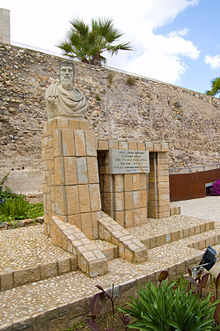Hasdrubal the Fair
| Hasdrubal the Fair | |
|---|---|

Hasdrubal bust in Cartagena, Spain
|
|
| Born | Circa 270 BC Carthage |
| Died | Qart Hadasht |
| Occupation | Military leader and politician |
| Predecessor | Hamilcar Barca |
| Successor | Hannibal |
Hasdrubal the Fair (c. 270 BC – 221 BC) was a Carthaginian military leader and politician, governor in Iberia after Hamilcar Barca's death, and founder of Cartagena.
Livy's History of Rome records he was the brother-in-law of the Carthaginian leader Hannibal and son-in-law of Hamilcar Barca.
Hasdrubal followed Hamilcar in his campaign against the governing aristocracy at Carthage at the close of the First Punic War, and in his subsequent career of conquest in Hispania. In 237 BC, they parted towards the Peninsula, but around 231–230 BC Hasdrubal allegedly interceded in Hamilcar's name making the Numidian tribes from Northern Africa submit to the Barcid family; from there,Numidia fell into Carthage's sphere of influence.
After Hamilcar's death (228 BC, while besieging Heliké, a town in Hispania), Hasdrubal succeeded him in the command, following Carthage's instructions, Hamilcar's sons being too young – Hannibal, the elder, was nineteen. He largely preferred diplomacy to war campaigns. According to the diplomatic customs of the time, Hasdrubal demanded the handing over of hostages to make himself sure of the submission of their places of origin.
Thus, he extended the newly acquired empire by skillful diplomacy, consolidating it by founding the important city and naval base of Qart Hadasht, which the Romans later called Carthago Nova (Cartagena]) as the capital of the new province, and by establishing a treaty with the Roman Republic which fixed the River Ebro, Iberus in those times, as the boundary between the two powers. This treaty was caused because a Greek colony, Ampurias, and also Iberian Sagunto, fearful of the continuous growth of Punic power in Iberia, asked Rome for help. Hasdrubal accepted reluctantly, as Punic dominion in Iberia was not yet sufficiently established to jeopardise its future expansion in a premature conflict.
...
Wikipedia
